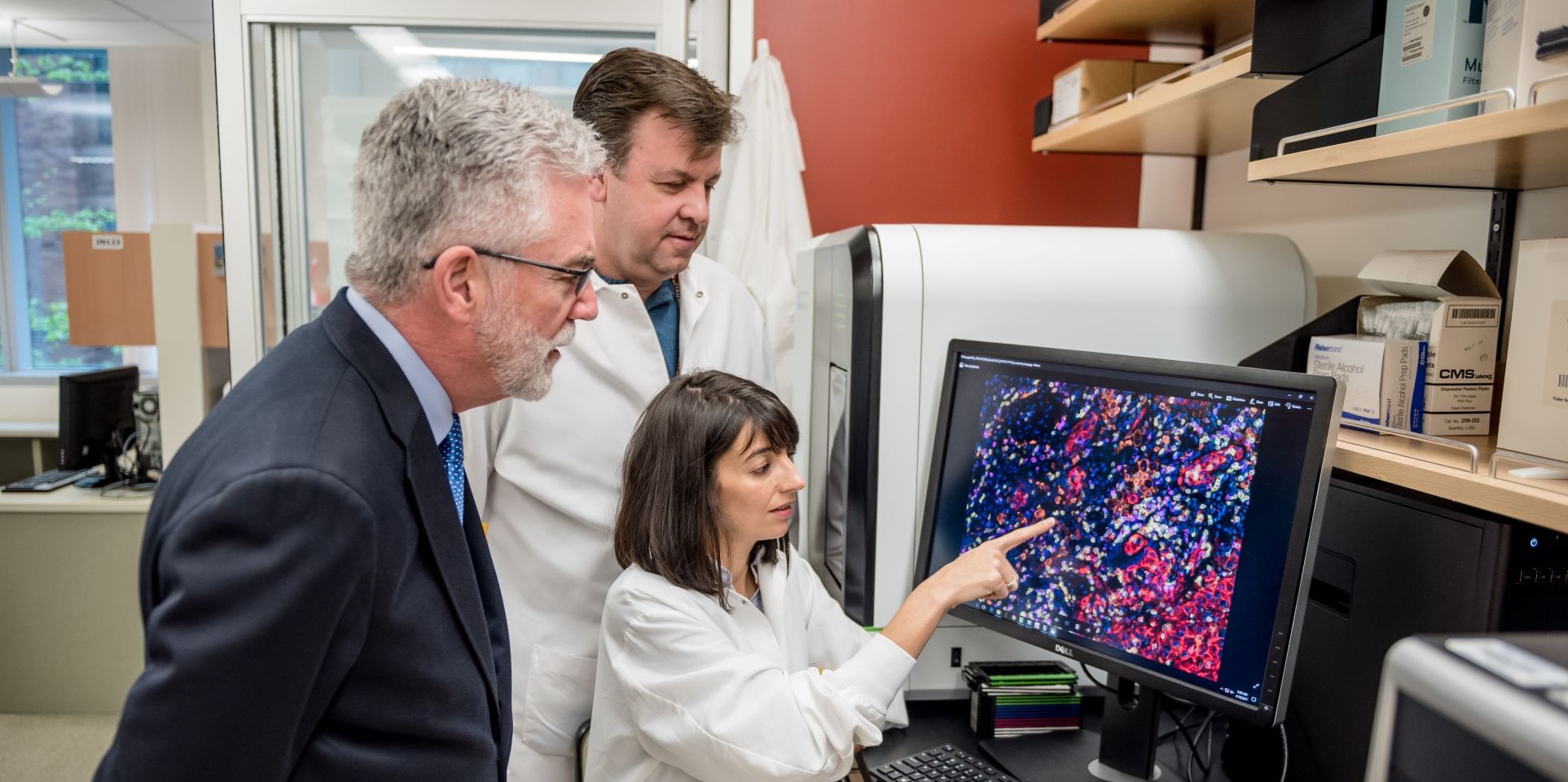Curriculum
Our fellowship program follows the AHPBA recommended curriculum.
By the completion of the two-year HPB fellowship, the fellow will:
- Be able to independently perform the following operations with an appropriate
first assist: open pancreatoduodenectomy, laparoscopic or open distal
pancreatectomy/splenectomy, laparoscopic or open targeting and ablation
of a liver tumor, laparoscopic or open left lateral segmentectomy, laparoscopic
or open wedge resection, laparoscopic or open radical cholecystectomy
(4b/5 partial hepatectomy), laparoscopic or open portal lymphadenectomy,
laparoscopic or open choledochoduodenostomy, open bile duct resection
with roux-en-Y intra-hepatic hepaticojejunostomy, open major hepatectomy
(right hepatectomy, left hepatectomy, right trisegmentectomy, left trisegmentectomy,
segment selective major hepatic resection)
- Understand the complexity of incorporating the following minimally invasive
techniques into their future clinical practice with appropriate mentorship:
laparoscopic or robotic pancreatoduodenectomy, laparoscopic or robotic
major hepatectomy (right or left hepatectomy), hepatic artery infusion
pump placement.
- Understand the pre-operative clinical assessment, intra-operative considerations,
and post-operative management necessary when planning a major hepatic
resection.
- Understand how to calculate liver volumes when planning surgical resections
and calculate estimates of future liver remnant and kinetic growth rate.
Understand the pathophysiology and clinical indications for selective
portal vein embolization.
- Independently perform a thorough intra-operative ultrasound of the liver,
pancreas, porta hepatis, and adjacent lymph nodes.
- Have a thorough understanding of the anatomy and physiology of the liver
and its relationship to adjacent structures, how to interpret and utilize
hematologic and biochemical tests which correlate with liver function
and hepatocellular injury.
- Have a thorough understanding of the options for liver imaging (including
CT, MRI, PET, and ultrasound) their costs, implications, and indications
for clinical use and pre-operative planning.
- Have a thorough understanding of benign and congenital liver, biliary tract
and pancreatic lesions, including their imaging characteristics, indications
for intervention, treatment options, and risk of post-surgical complications
and/or clinical sequelae.
- Have a thorough understanding of malignant and neoplastic liver lesions,
including a broad differential diagnosis that includes both primary liver
and biliary malignancies (including hepatocellular carcinoma, cholangiocarcinoma,
gallbladder cancer) as well as metastatic lesions, including their pre-operative,
intra-operative, and post-operative considerations, appropriate staging
work-up and the role of neoadjuvant and adjuvant systemic, regional, and
radiation therapy options.
- Have a thorough understanding of the anatomy and physiology of the gallbladder,
biliary tract, and ampulla of vater, be able to diagnose congenital and
acquired biliary tract disorders and develop a multi-disciplinary treatment
strategy incorporating surgical, endoscopic, and interventional techniques
where appropriate
- Have a thorough understanding of the options for biliary imaging (including
CT, MRI/MRCP, HIDA, and ultrasound) their costs, implications, and indications
for clinical use and pre-operative planning.
- Diagnose and work-up common bile duct injuries following cholecystectomy,
understand the pre-operative, intra-operative, and post-operative management
strategies, perform an appropriate operative bile duct reconstruction
- Have a thorough understanding of malignant and neoplastic lesions of the
ampulla and pancreas, including a broad differential diagnosis that includes
pancreatic adenocarcinoma, mucinous cystic neoplasms and IPMN, extra-hepatic
cholangiocarcinoma, peri-ampullary cancers, neuroendocrine tumors, and
solid pseudopapillary tumors, including their pre-operative, intra-operative,
and post-operative considerations, appropriate staging work-up and the
role of neoadjuvant and adjuvant systemic, regional, and radiation therapy options.
- Have a thorough understanding of the anatomy and physiology of the pancreas,
understand the implications of pancreatic endocrine and exocrine functions,
be able to diagnose and treat pancreatic insufficiency and perform an
adequate assessment of risk for development of diabetes following surgical
pancreatic procedures.
- Have a thorough understanding of the options for pancreatic imaging (including
CT, MRI, PET, and ultrasound) their costs, implications, and indications
for clinical use and pre-operative planning. Understand the role of EUS
and ERCP in the evaluation of pancreatic, biliary, and peri-ampullary lesions.
- Understand the multi-disciplinary approach to the management of hepatocellular
carcinoma in patients with underlying cirrhosis and liver insufficiency.
Understand when to incorporate surgery, liver-directed therapies (including
bland embolization, TACE, and Y90), and systemic treatments.
- Understand the multi-disciplinary approach to the management of metastatic
neuroendocrine tumors, including pre-operative work-up, staging, use of
selective imaging modalities (DOTATATE Ga68 PET), role for systemic treatments,
liver-directed therapy, and PRRT, and understand the role of surgical
management of liver metastases in both functional and non-functional tumors.
- Have exposure to the multi-disciplinary management of complex malignancies
including gastric and esophageal cancer, soft tissue sarcoma, gynecologic
malignancies requiring complex upper abdominal debulking, metastatic melanoma,
renal cell carcinoma, locally advanced colon cancer, and adrenal cell
carcinoma.
- Have exposure to complex vascular reconstructions, including portal vein
and inferior vena cava resection and reconstruction
.png)
Research
Fellows have some dedicated research time during their first year and it
becomes a primary focus during their second year. They participate with
post-doctoral researchers and research fellows in weekly research meetings
and in the administration of a variety of clinical and lab-based research
efforts. They have unlimited access to state-of-the-art basic science
labs and our animal/cadaver procedural investigation lab.
Fellows are supported by their Program Director, faculty mentors, and a
clinical research nurse.

.png)
